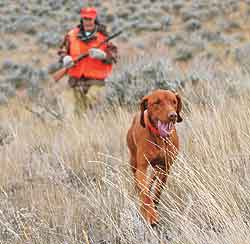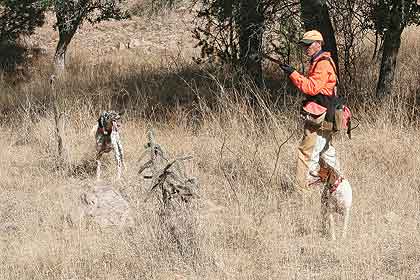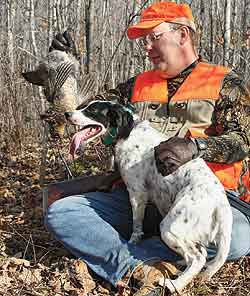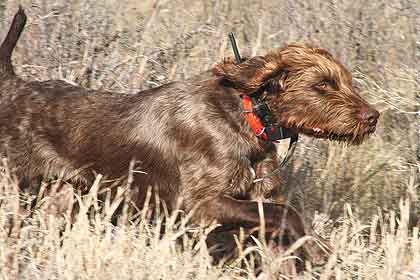By Dave Carty
 Allowing pups to learn from their mistakes is key in their development. |
The first two years of a puppy's life are critical to its development as a bird dog.
I'm not an animal behaviorist, so you'll forgive my necessarily loose definitions of the three stages of a dog's life. But my observations of dogs over the years falls roughly into three periods. The first is puppyhood -- the age from seven weeks to 10 or 11 months, when a pup is learning about the world around him.
The third is adulthood, from about age two and up, when a dog is mature physically and emotionally and dealing, for better or worse, with the world as he sees it. But the period I'll be talking about today is the second, the stage between puppyhood and adulthood.
Call it the canine 'tween years.
Dog 'tweeners are like human teenagers -- full of unrealized potential but in need of a strong guiding hand. Pups at this stage are old enough to know what they're supposed to do but not mature enough to do it without your help. Keeping them from making too many mistakes -- while allowing them to learn from the mistakes they do make -- is as important a job as you'll have at any time during the rest of their lives.
At this stage, if you've been training your pup yourself, you probably are, or should have, the lion's share of yard training behind you. That means the dog's commands -- whoa, come, kennel, heel, etc. -- are reasonably well established, but probably not perfect.
You've had your puppy out in the field on numerous runs and most of the time he listens when you give him a command.
He's finding and pointing birds, which sometimes he holds and sometimes he chases. He may or may not be retrieving bumpers or birds and he's almost certainly not steady to wing and shot, something that, if you choose to go that route, should be taught later in his life. But he's coming along. He's beginning to hunt like a real bird dog.
 There's a time and place for pairing your young dog with another. Don't rush it. |
Incidentally, there's no statute of limitations on any of the training I've mentioned so far.
If your dog's training isn't complete until age two, three or five, don't sweat it. The principles are the same.
In any event, now it's the real deal: the season has finally arrived. How your pup does depends to a large extent on mindset -- yours, not his.
I'm not sure many people really understand how important it is to have a game plan for a dog's first season. Most of the amateur trainers I know spend more time planning their Saturday tailgate parties than they do their dog's introduction to hunting, which will profoundly influence that dog's obedience, style and behavior for the rest of his life.
Instead, a common attitude seems to be, "Let's just turn him loose and see how he does."
I hate that attitude.
 A bird in hand is the ultimate reward for sticking to your training regimen and insisting your dog perform according to your rules, not his. |
Calling someone a control freak isn't a compliment, but letting your inner control freak emerge at this stage of your pup's life isn't necessarily a bad thing. Certainly you can go overboard, trying to orchestrate your dog's every cast. But far more people cut their dogs too much slack, allowing them to get away with ignoring commands and busting birds, mistakes that will return again and again to haunt them.
The choice is yours to make: do you continue to enforce the commands you established during summer training sessions? If your answer is yes, there are consequences. Initially, you won't shoot many birds over your dog; that's a job you're going to delegate to friends. At least for the first few weeks of the season -- and possibly the entire year -- you also won't have the luxury of relaxing. You'll need to keep your eyes on your dog and your hand near your whistle and e-collar transmitter.
If you choose not to do those things, your dog will regress to a level of compliance that's comfortable for him, not you. That may be fine. But if you want your dog to fulfill his potential, you have to stay in charge and see that he continues to develop in the right direction.
By the way, before I go any further, let me clear up one common misconception. Hunting your dog with another dog won't teach it much of anything. There's a time and a place for pairing your pup with a more experienced dog, which I'll cover shortly. But another dog -- no matter how good he is -- won't teach your dog how to handle birds. And he certainly won't teach him to obey your commands. So nice try, but you're not off the hook.
Since you're now at the point where the success or failure of your pup's first season is largely in your hands, let's talk about some of the basic principles I follow. The first is that, no matter how swimmingly the pup did over the summer -- retrieving birds, pointing with style, snapping to on commands -- I never expect flawless behavior during a pup's first season. Instead, I begin each hunt with an inexperienced dog expecting the worst.
This isn't pessimism; this is reality born of hunting over dozens of young dogs, including a half dozen of my own. No matter how well you try to structure your summer training sessions to reflect reality -- and you should -- an actual hunt will be far more exciting to a youngster than anything he's experienced before. What's more, you won't be able to control where he finds birds or how those birds react. And believe me, it won't take him long to figure that out.
So, for instance, if I've trained my dog to whoa on command and not move until released, I expect him to creep on a real hunt even if I've given him the command to whoa seconds before. The scent of a wild bird may well be too exciting for him to resist, and since I'm expecting him to disobey, I approach him on point with my thumb on the e-collar button.
Needless to say, I also have a friend along to do the shooting. (You won't have trouble finding volunteers.) If you do nothing else with your dog during his first season, this principle alone will save you years of aggravation and do wonders for your dog's future handling. It works the same way with every other command he knows, too.
 For young dogs with plenty of independence, hunting them with an older "mentor " dog is unnecessary. |
Remember, he's still a teenager at heart. And, like us all, we've been there too.
The thing about structured training sessions is that they're under your control. But on an actual hunt, there are endless and annoying gray areas you have to evaluate. If your dog disappears into a patch of woods and a deer bolts out the other side, did he chase it? If he's behind a hill and a covey blows out, did he bust them? Should you correct him even if you didn't see him commit the crime?
I don't have answers to those questions, even with my own dogs. So the second principle I operate under is that, at least until the dog has settled into maturity and I have a reasonable chance of predicting his behavior, I won't correct him for transgressions I don't actually witness. Yeah, that probably means he's going to bust some birds and chase some rabbits from time to time, but that won't ruin him. Stick to the program and eventually he'll come around.
My last guiding principle regards the establishment of intangibles -- how a youngster hunts, where he looks for birds, and how he handles them when he finds them. Here's where limited hunting with an older, more experienced dog may jump-start the process.
Again, that dog won't teach the youngster where the birds are. But he'll find them himself, and the pup, assuming he's following, will become tremendously excited when the birds go up. After chasing them a bit, he'll want to come back and scour the area again. By all means, let him. He's filing that information for future reference.
But the very thing that proves beneficial in small doses can hurt your pup's development in the long run. I once made the mistake of running one of my own young setters with other dogs during her first season, and as a result, it was years before she learned to hunt on her own. Once a youngster shows a glimmer of independence, it's time to let him hunt solo until those habits are firmly ingrained.
For those pups that show independence and drive right out of the gate, no mentor dog is necessary. The more they hunt on their own, the better they'll become at finding and handling birds. Of course, this means that your pup will screw up on a regular basis. He'll completely miss coveys you've marked down, hunt obviously non-productive areas, and crowd birds. All this is normal. At least for now, keep your thumb off the transmitter, grit your teeth, and let him go. He has to figure those things out on his own.






